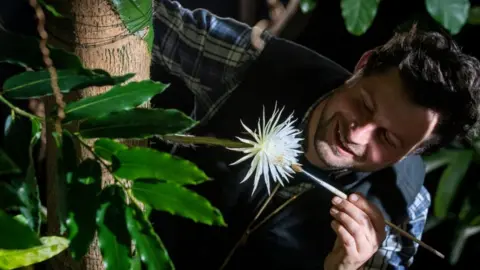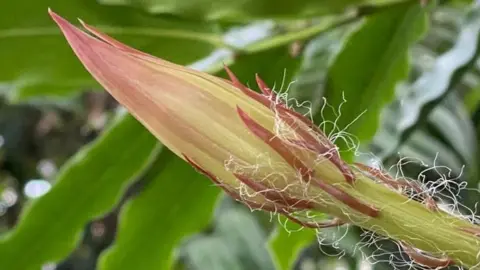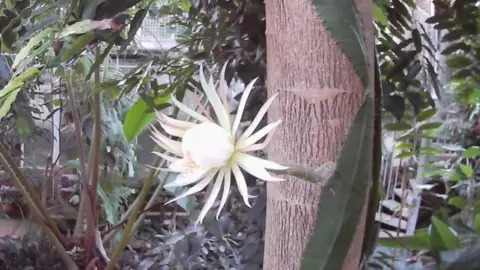Cambridge moonflower: Team 'overwhelmed' by global response
The team who cared for a rare Amazonian cactus that flowered for just one night have been "overwhelmed" by the global response to the bloom.
Experts at Cambridge University Botanic Garden believe it is the first time the moonflower Selenicereus wittii has bloomed in the UK.
Thousands tuned in as the flowering drew close and a YouTube stream has had almost 195,000 views.
Glasshouse supervisor Alex Summers said the experience had been "amazing".
 PA Media
PA MediaThe cactus - which normally flowers at night for just 12 hours - caught many of those awaiting the bloom off guard when it started to blossom at about 15:00 GMT on Saturday.
A webcam had been focused on the single bud for the previous 11 days.
Mr Summers said the flower, which was spotted developing in November, had been "supposed to come out" at 21:00, "but plants never read the books".
He said since the bloom, the team had "been able to record it, pollinate it and share it with as many people as possible".
However, only the glasshouse's staff have been able to experience its unique scent, which Mr Summers said had "started off... like honeysuckle or gardenias", but by morning, had "slightly altered and we're now in the realm of public toilets".
 CUBG
CUBGThe plant normally grows high above the Amazonian floodplains by attaching itself to a host plant and flowers at night to attract its two pollinating species of hawkmoth.
The delicate petals of the white flower, measuring 11in (28cm) long by 6in (15cm) wide and sitting at a height of 12ft (3.5m) on the plant, started to fade overnight.
The garden's dedicated moonflower page has received nearly 205,000 views, from people as far afield as Australia, Finland and Thailand.
 Cambridge University Botanic Garden
Cambridge University Botanic GardenMr Summers said he thought the interest was due to the cactus usually being "inaccessible" where it grows in the "deepest, darkest Amazon".
He said the team had been "overwhelmed", adding: "People have followed it from start to finish."

Find BBC News: East of England on Facebook, Instagram and Twitter. If you have a story suggestion email [email protected]
